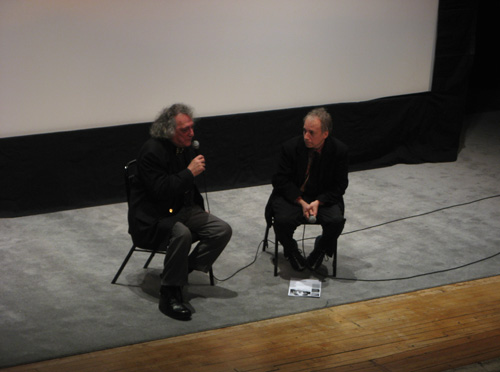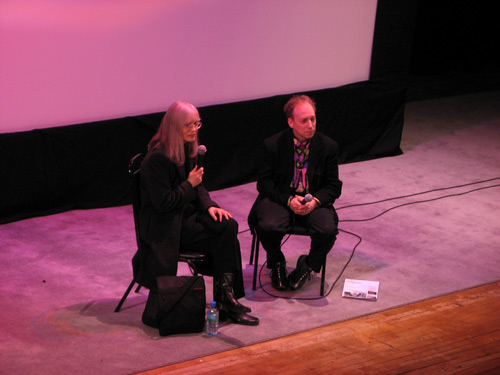Tag: Town Hall
Meet me in Malta
On the slate for tonight’s film seminar: A Previous Engagement, which contrary to its British period piece-y sounding title is a romantic comedy, and one which rather unusually features a cast of characters over 50.
Juliet Stevenson stars as Julia, a Seattle-based woman vacationing in Malta with her husband (Daniel Stern). Unbeknownst to him, she is there to fulfill a long-ago promise to reunite with her French lover, Alex (Tchéky Karyo) with whom she had an intense affair on the island years earlier. The premise called to mind a bit of Before Sunrise — that wondrous film about “two nice kids, literate, sensitive, tentative, intoxicated by the fact that their lives stretch out before them, filled with mystery and hope, and maybe love.” Except here, the two parting lovers decided to meet not in six months, but in twenty-five years, after much of their lives have been lived. In the intervening time, the once aspiring writer Julia has become a middle-aged librarian married to a jigsaw puzzle-obsessed insurance salesman, and Alex an oft-divorced literary journal editor. Once the pair is reunited, complications ensue, and the results are mixed: part screwball comedy, part bedroom farce and part bittersweet romance.
Writer-director Joan Carr-Wiggin was tonight’s guest, and talked about getting this film made in a climate where most Hollywood films have a young, often male, sensibility. The economist turned filmmaker well understood the steep challenges a film such as hers would face in financing; in this case her husband, producer David Gordian, was able to fund the film in Canada and Europe, where Carr-Wiggins claims the system is much more welcoming towards women directors and character-based films than in the United States.
Because the film was fully financed at the outset, Carr-Wiggins had full control over her film – a rare privilege for a second-time director. She was able to cast her favorite actress in the lead; Stevenson has a long list of British television and film credits, but is probably best known for her role as cellist Nina in Truly, Madly, Deeply (1990) — the late great Anthony Minghella’s film debut.
While the film has a certain intriguing “What if…?” premise, the execution was a bit too ham-fisted for my tastes. (Does the husband really have to be so cluelessly boring, the daughters so gratingly self-absorbed?) Credit is due, though, for framing the story around a middle-aged woman — a demographic grossly underrepresented in current cinema — and for the not entirely predictable ending.
A Previous Engagement opened in New York and Los Angeles for Mother’s Day weekend, on May 9.
“There are all kinds of love in the world, but never the same love twice.'”
— F. Scott Fitzgerald, “The Sensible Thing”
Were truer words ever written?
La Misma Luna
Our film tonight was Patricia Riggen’s feature debut, Under the Same Moon (La Misma Luna)… it’s unclear to me why the English title adds the preposition. The press materials prominently note that the film premiered at the 2007 Sundance Film Festival where it received a standing ovation. On the strength of that audience buzz, Fox Searchlight and The Weinstein Company purchased the rights for $5 million, making it the second largest sale at the festival that year.
Under the Same Moon is the story of a young boy (Adrian Alonso) making a perilous journey across the U.S./Mexico border to be reunited with his mother (Kate del Castillo), who is working as a maid in Los Angeles. The film also features brief cameos by America Ferrara of ABC’s Ugly Betty and Grammy Award-winning Mexican band Los Tigres del Norte.
I was reminded of another film set against the thorny backdrop of illegal immigration: Gregory Nava’s excellent El Norte, which I first watched in Sra. Slavin’s sophomore Spanish class. There, it was a brother and sister fleeing war-torn Guatemala for a “better” life in California (“Take me! I’m a strong pair of arms!”); Under the Same Moon broadcasts similar messages about the plight of undocumented Mexican workers struggling to survive in the United States.
The main focus, though, is about the love between mother and son. Despite an all-too-predictable trajectory and deliberately heart-tugging melodrama, this film managed a few surprisingly effective emotional moments, thanks in large part to Alonso’s performance as Carlitos. The 14-year old Mexico City-born actor (who plays a 9-year old, believably) is familiar to American movie goers for his role as Antonio Banderas’ precocious son in 2005’s The Legend of Zorro.
Reviews have been mixed: The New York Times dismissed the film for its mawkishness and lazy caricatures (“It has bad white people, hard-working brown people and morally ambivalent people of mixed race.“); The Washington Post praised the film for its “affecting story, indelible characters, urgent topical relevance and superbly calibrated sentimentality.”

The post-screening discussion was with William Wolf (left, in the photo above), author and former film critic for Canada’s Cue Magazine, New York magazine, Gannet newspapers and the New York Observer, and current member of New York Film Critics Online, an organization of 26 Internet film critics based in New York City. Wolf was charmed by Under the Same Moon… and though I’m probably one of those he describes who “rebel against manipulation,” darned if I didn’t get a little misty-eyed at the ending, too.
The Duchess of Langeais
My Town Hall Feature Film Seminar Series began in earnest this week. For the next three months, I’ll be in Times Square every other Monday night — a frequency which I used to describe as “bi-weekly.” Until rather recently, I thought that “bi-weekly” was synonymous with “fortnightly” — which it is — but Merriam-Webster lists a primary definition of “occurring twice a week.” So yes, the two definitions vary by a factor of four, and technically, “bi-weekly” could mean the same as “bi-monthly.” Gee, you think this ever causes any confusion?
Tonight’s film was Jacques Rivette‘s The Duchess of Langeais (Ne Touchez pas la Hache) — an adaptation of Honoré de Balzac’s novella, La Duchesse de Langeais. (The English title of the French film keeps the author’s original title, while the French “Don’t Touch the Axe” is culled from an ominous anecdote in the film.) The much-admired Antoinette de Langeais (chanteuse/actrice Jeanne Balibar), a married aristocrat with an oft-absent husband, is bored by her lavish, but empty Restoration-era Parisian lifestyle. She meets a Napoleonic war hero, the dashing General Armand de Montriveau (Guillaume Depardieu — yes, son of Gérard) — and the two begin an intense, but unconsummated flirtation, during which the duchess tantalizingly retains the upper hand to the endless frustration of de Montriveau – an imposing man clearly used to getting his way. Eventually, however, both control and power shift to de Montriveau and the story evolves into a tale of obsessive passion between two ill-starred, stubbornly unyielding — and thus frustrated – partners plunged into the alienating, often degrading, depths of love.

Afterwards, we sat through one of our more erudite post-film discussions, featuring guest Godfrey Cheshire (left), the director and New York-based film critic. I learned more in this single night about Rivette and the Nouvelle Vague (the French cinema movement, that is, not the musical collective) than in all my years of watching movies. Then again, the man behind such films as Céline and Julie Go Boating, Va Savoir and La Belle Noiseuse is generally considered the most experimental, and therefore the least screened, of his renowned colleagues Jean-Luc Godard, Éric Rohmer, and François Truffaut. It may have something to do with Rivette’s deliberately challenging films and penchant for length; one of the director’s earlier masterpieces, Out 1, is another Balzac adaptation that infamously stretches well over twelve hours long — 743 minutes, to be precise. That’s almost 9 Cloverfields! Sacrebleu!
| S | M | T | W | T | F | S |
|---|---|---|---|---|---|---|
| 1 | 2 | 3 | 4 | 5 | 6 | |
| 7 | 8 | 9 | 10 | 11 | 12 | 13 |
| 14 | 15 | 16 | 17 | 18 | 19 | 20 |
| 21 | 22 | 23 | 24 | 25 | 26 | 27 |
| 28 | 29 | 30 | 31 | |||
Search
Popular Tags
Categories
Archive
- July 2010
- July 2009
- January 2009
- November 2008
- September 2008
- August 2008
- July 2008
- June 2008
- May 2008
- April 2008
- March 2008
- February 2008
- January 2008
- December 2007
- November 2007
- October 2007
- September 2007
- August 2007
- July 2007
- June 2007
- May 2007
- April 2007
- March 2007
- February 2007
- January 2007
- December 2006
- November 2006
- October 2006
- September 2006
- August 2006
- July 2006
- June 2006
